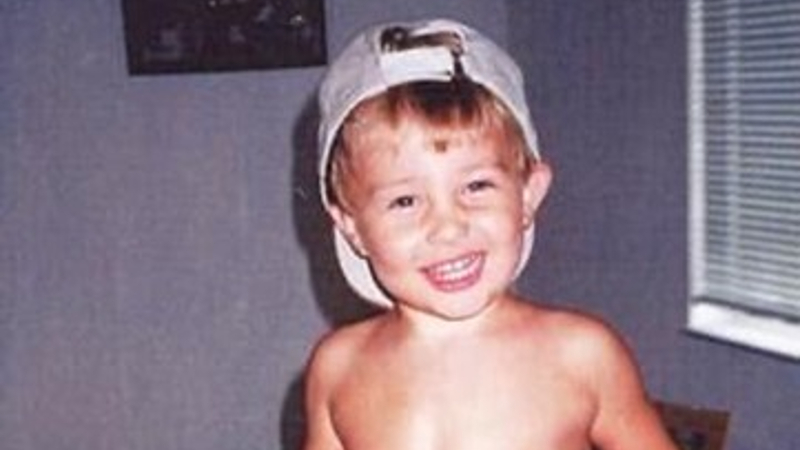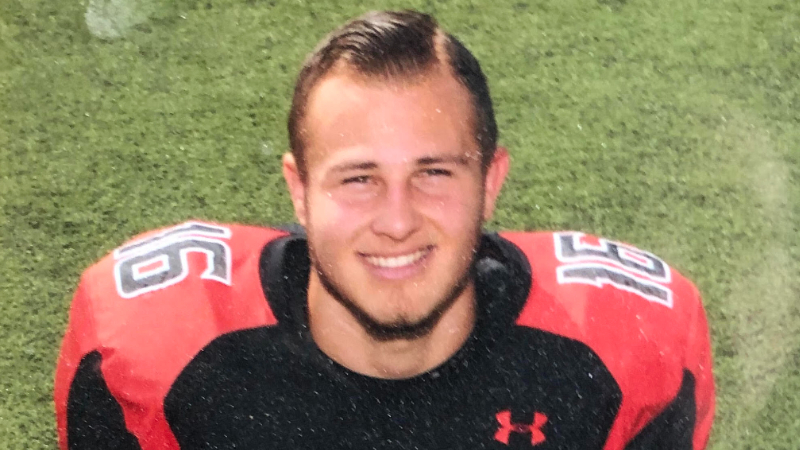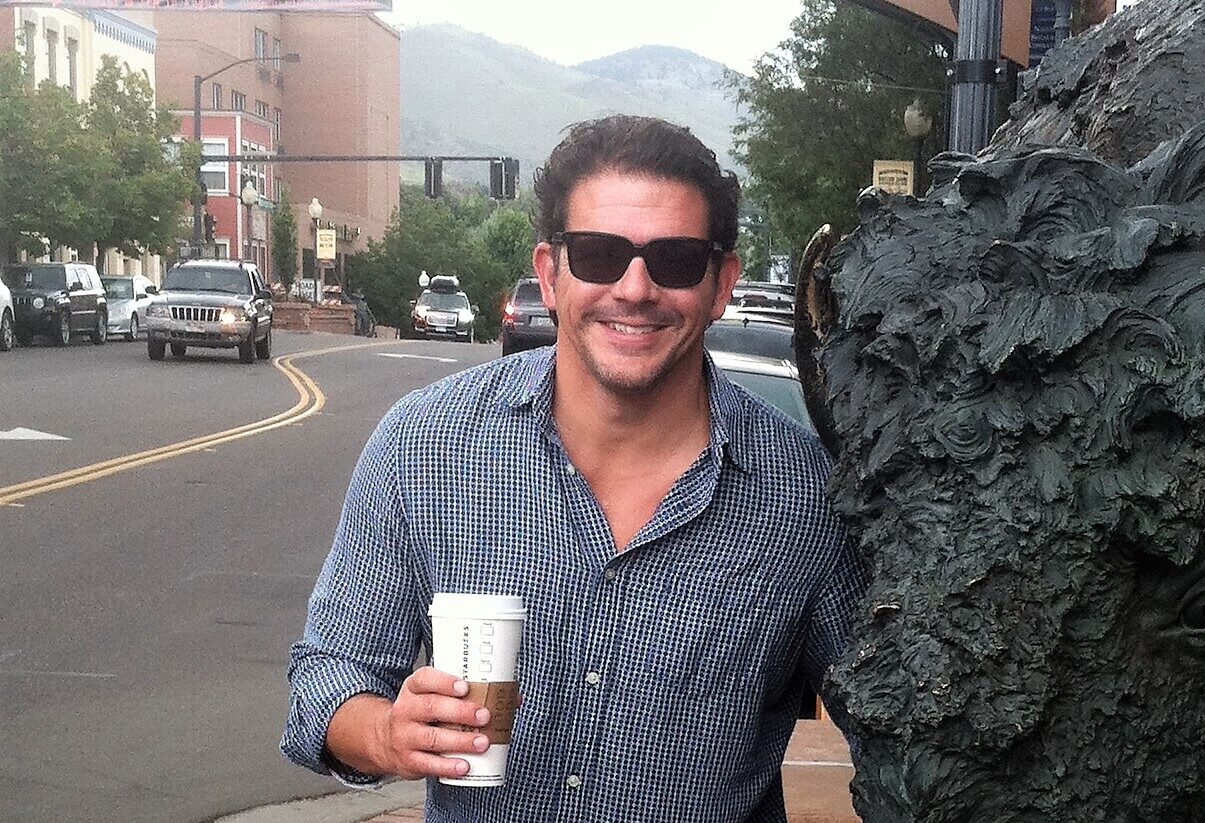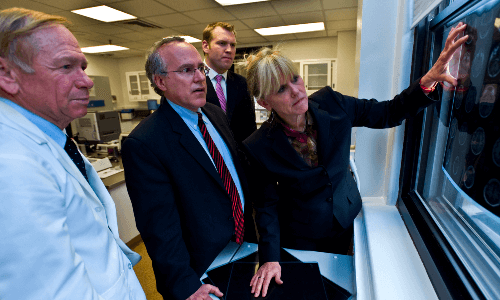Zachary Holm was a special young man who lived life to the fullest. He played safety for the University of Wyoming and was a devoted father, partner, and son. After football, Zach started having problems with concentration and struggled with depression. He passed away from serotonin syndrome on March 27, 2021, at the age of 23. Zach’s brain was donated to the UNITE Brain Bank, where researchers later diagnosed him with stage 2 Chronic Traumatic Encephalopathy (CTE). Zach’s family is telling his story to share his Legacy and raise awareness of this disease.

Warning: This story contains mention of suicide and may be triggering to some readers.
Special. This is the word most often used to describe Zachary Ryan Holm. The first time we heard it was when he started played flag football at age six. Growing up in Florida, Zach was very blessed to have been coached by former NFL and college football players. From an early age, Zach was encouraged to work hard and was told he would be able to go as far in football as he desired. Zach took this to heart. He was a big kid, so he began playing competitive youth tackle football at age seven, playing every position on the team. At age 10, his coach called him “hybrid” because he was big, strong, fast, and smart. He started playing quarterback and continued all through high school. Going to a small high school in Colorado, Zach ended up playing both sides of the ball and led his team in touchdowns as well as tackles. Zach was recruited to play safety at the University of Wyoming. At six-foot, he was considered “short” for a quarterback but UW coaches were impressed with the hard hits Zach delivered on defense, so they recruited him to play safety.

Those hard hits over many years Zach delivered on defense, and the hits he took as a QB set him up for CTE. Zach had five known concussions, the first of which came at age nine. He started having problems with depression at age 13 and had difficulty sleeping and with concentration at age 16. Zach started attention deficit disorder (ADD) medication at age 18. The medication initially helped with depression and concentration, but the therapeutic effect started to wane. Zach was excited to be recruited to play football at a D1 school, but his depression worsened. He told me, “Mom, the football wasn’t hard, it was the depression that was difficult.” Zach resigned from the UW team during his freshman season in December 2016 and never returned to football. Zach’s first paper at UW was about CTE. He highly suspected he had CTE from playing 12 years of tackle football.

After UW, Zach transferred to a private college in Florida and really struggled with depression. He returned to Colorado to be near family. Zach battled suicidal thoughts and was open about his suicidality. Zach felt guilty about being depressed because he felt like he had everything going for him. He started feeling “numb” and said, “my brain is broken.” Zach participated in any form of therapy offered. He tried multiple medications and even ketamine infusions which helped for about 24 hours. He was compliant with every therapy and was disappointed when none of them helped. We talked about CTE. Zach knew it was a diagnosis only made at autopsy.

Zach attended a private Christian school in Tampa from ages four to 13. This is where his Christian faith was solidified. He was a leader both in the classroom and in every sport he played. Zach was called very “special” by his teachers and classmates. His kindergarten teacher described him as “a mix of sweetness and testosterone.”

Zach loved tattoos and had scriptures tattooed on his arms. In 2016, he decided to get a chest piece tattoo depicting a demon fighting an angel over his heart. Zach said he always wanted to be reminded he was not alone in his fight against depression and the devil.

Zach’s depression was growing worse, and he was getting daily headaches and hearing high pitched noises, causing physical pain. An MRI of his brain was normal. Medications were not helping with his mood. He was evaluated by five psychiatric professionals, the last of whom informed Zach he had treatment resistant depression. He tried nonprescription drugs which helped a little. Despite all these mental health challenges, Zach was attending the University of Colorado and getting excellent grades. Then he got COVID-19 in November 2020 and had to take a medical withdrawal. Zach was set to begin classes again in June 2021 with the eventual goal to attend law school. He was extremely driven as can be seen in the following excerpt from his LinkedIn page:
“Most people who know me describe me as a chronic perfectionist, as I give everything that I do my full attention and effort. In conjunction with time management, perfectionism is very beneficial. From my perspective, there is no point in me doing something if I do not intend to do it to the fullest of my capability. I am driven to be the best at whatever it is that I decide to do.
What differentiates me from the rest of the pack is my passion and drive for success, which is reflective with my persistence and consistency in terms of my work ethic; once I set my mind to something, nothing will be able to stop me from achieving it.
This is reflective of one of my firm views, which is the significant dislike of complacency. There is nothing more detrimental to the individual than complacency.”
Zach met a special young lady in the middle of his physical and emotional turmoil, and they were blessed to bring a beautiful baby girl into this world in 2020. Zach was an excellent father. His baby was the light of his life and became his purpose for living.

Zach became ill with acute respiratory symptoms in March 2021, and he took over the counter cold medicine which negatively interacted with his depression medications. He died from serotonin syndrome on March 27, 2021. We were able to donate Zach’s brain to Boston University for their CTE research. An hour after we heard of his death, we were contacted by Donor Alliance because he had signed up to be an organ donor. They described Zach as “special” because he was young and muscular and would be able to help about 50 recipients with the donation of his corneas, skin, bone, and muscle.
At Zach’s memorial and for months afterwards, we were contacted by people who had been touched by Zach’s life. Stories of him feeding the homeless, stopping someone from jumping off a bridge, and being a “special” person because of his incredible faith and love for his family. Zach always looked out for people who struggled. We often had stray kids staying at our house when they had difficulties at home. Zach was described as “kind,” and received the fruit of the spirit award at Christian school for “gentleness.” All of these attributes were far more important to him and to us than his stats on the football field.
Ten months after Zach’s death, we had a meeting with Dr. McKee from Boston University. She verified Zach had stage 2 (of 4) CTE. Zach had multiple lesions in various areas of the brain responsible for mood and impulsivity. Dr. McKee described Zach’s severe brain damage as unexpected in a 23-year-old. Also, it was no surprise to Dr. McKee hearing none of Zach’s medications really helped with his depression and anxiety.
This news from BU was devastating but also comforting, because Zach knew his brain was “broken” and he worked hard to stay ahead of his depression and suicidality. After meeting with Dr. McKee, I had my first dream about Zach after 10 months. In it, Zach was whole and happy. He also had a bounce to his step, and I am sure he was telling me, “I was right about my brain.” Zach always liked to be right!
We are blessed to know our very special son is still helping others. Zach’s experience and study participation are helping researchers to make changes in football so it is safer, and his death is helping to develop more useful ways to diagnose and potentially treat CTE. We are crushed about losing our son. At the same time, we are proud of his insight into brain injuries and his prediction regarding his CTE. Zach’s knowledge fueled our desire to donate his brain to Boston University. As everything else Zach did on this earth, his participation in the BU study was “all in.”


